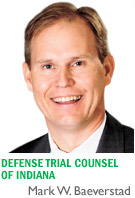Subscriber Benefit
As a subscriber you can listen to articles at work, in the car, or while you work out. Subscribe Now
 A patient comes to the hospital and receives twice the amount of thrombolytics ordered by the cardiologist. The thrombolytics have a risk of causing hemorrhagic stroke. Two days later, the patient strokes and dies. The treating cardiologist is of the opinion that the stroke was caused by the excessive dose given to the patient. Does this seem like a “no brainer” on causation?
A patient comes to the hospital and receives twice the amount of thrombolytics ordered by the cardiologist. The thrombolytics have a risk of causing hemorrhagic stroke. Two days later, the patient strokes and dies. The treating cardiologist is of the opinion that the stroke was caused by the excessive dose given to the patient. Does this seem like a “no brainer” on causation?
But what if a peer-reviewed case control study found no statistical difference in the risk of stroke between the amount ordered by the cardiologist and the amount mistakenly given to the patient? What if this same scientific study changed the practice of medicine to the extent that patients now receive the dose of thrombolytics mistakenly given to the patient? In that situation, can the cardiologist’s opinion on causation past muster under Daubert and Rule 702 of the Indiana Rules of Evidence?
It was this precise issue that was addressed in the case of Akey v. Parkview Hospital, 941 N.E.2d 540 (Ind. Ct. App. 2011), trans. denied, 2011 Ind. LEXIS 522. There, in response to 89-year-old Akey’s heart attack, the cardiologist told the emergency physician to give Akey one-half dose of the thrombolytic, TNKase, and one-half dose of ReoPro. Due to a communication breakdown between the emergency department physician and the nurses, Akey received the one-half dose of TNKase but also received, instead of ReoPro, a one-half dose of another thrombolytic, Retavase. Two days later, Akey stroked and died.
Several years later, a peer-reviewed case control study (GUSTO-V) compared the risk of stroke in patients who received a one-half dose of a thrombolytic along with ReoPro to the risk of stroke in patients who received a full dose of a thrombolytic without ReoPro. The study found that, in patients over 75 years of age, the risk of an intracranial bleed was statistically insignificant. Based upon that study, cardiologists abandoned the practice of giving patients a one-half dose of a thrombolytic with ReoPro and began giving patients full doses of a thrombolytic with no ReoPro.
Despite the treating cardiologist acknowledging the authority of the GUSTO-V study and that it changed the way he practices cardiology, he held fast to his opinion that the dosing error caused Akey’s stroke. He could not cite to any study that supported his opinion.
Rule 702 (b) of the Indiana rule of Evidence reads: Expert scientific testimony is admissible only if the court is satisfied that the scientific principles upon which the expert testimony rests are reliable.
This is commonly known as the “gatekeeper” provision in which the trial court is charged with the responsibility of ensuring that expert opinion testimony that is based upon junk science is excluded. Based upon the Akey decision, one must question whether this rule applies at all to the opinions of licensed physicians. One cannot think of a situation where the opinions of an expert physician are more directly refuted by a reliable scientific study, yet the trial court was reversed in its determination that the opinions failed the requirements of Rule 702(b).
One would think that the standard of review for a judge’s role as gatekeeper under Rule 702(b) would be the same regardless of when the issue is raised. In Akey, this issue was raised in a motion for summary judgment. Given the extreme difficulty defending summary judgment on appeal, defense counsel may opt to raise this issue in a motion in limine where the standard of review is an abuse of discretion.•
__________
Mark Baeverstad is a partner in Rothberg Logan & Warsco and is a member of the DTCI Board of Directors. Baeverstad represents Parkview Hospital in Akey v. Parkview Hospital. The opinions expressed in this article are those of the author.
Please enable JavaScript to view this content.
